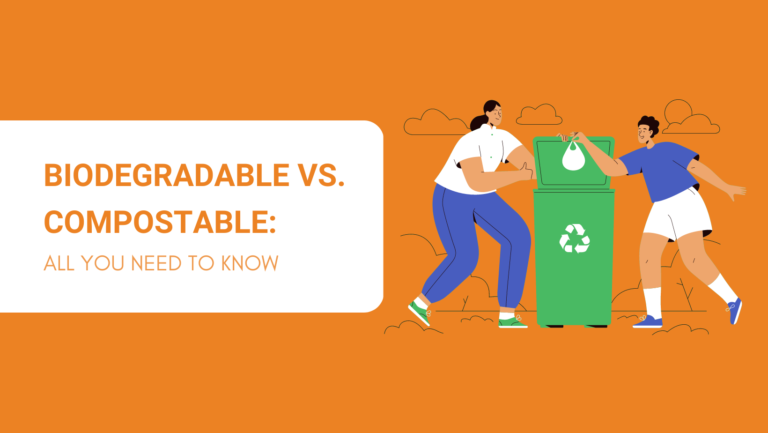There has been much debate on saving mother nature and keeping the environment green and sustainable. That’s why it is recommended to use biodegradable and compostable materials instead of harmful ones that take thousands of years to decompose.
But do you know the difference between biodegradable and compostable? Are they both the same and interchangeable? They have some similarities, but both are definitely not the same.
In this article, we have brought an ultimate comparison of biodegradable vs compostable. You will learn what they mean, their comparison, and how they relate to e-commerce businesses.
Let’s start.
Definition of Biodegradable
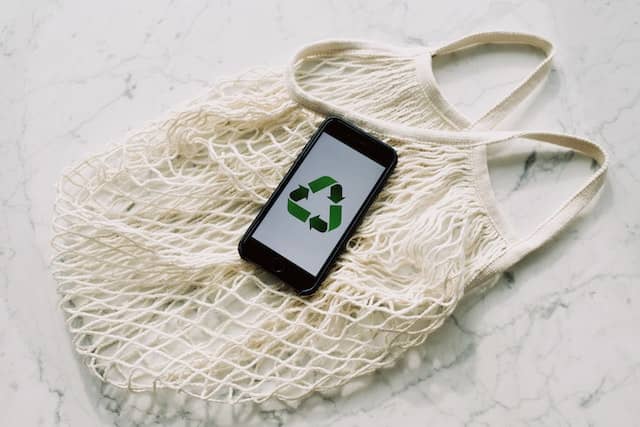
A biodegradable material refers to an object that can naturally decompose on its own without taking special steps. Typical examples include paper, food, plant, and human waste.
A biodegradable material does not necessarily require oxygen to break down. It can break down with the help of bacteria, microorganisms, or other natural substances. It may turn into carbon dioxide, water, and biomass over time, depending on the type of material. But, it will degrade for sure.
While everything technically degrades over time, biodegradable materials take lesser time to do so. They typically degrade in a year or less time. Plus, they degrade naturally with biological processes. Hence, the word “bio.”
A biodegradable object does not harm or pollute the environment. While it may have some harmful toxins, the amount of damage done to the ecosystem is much less than that caused by non-biodegradable objects.
A biodegradable material only ensures not to pollute or cause damage to the environment. It does not give anything useful to nature. So, you may say that a biodegradable material is safe for a sustainable environment but is not beneficial.
Definition of Compostable
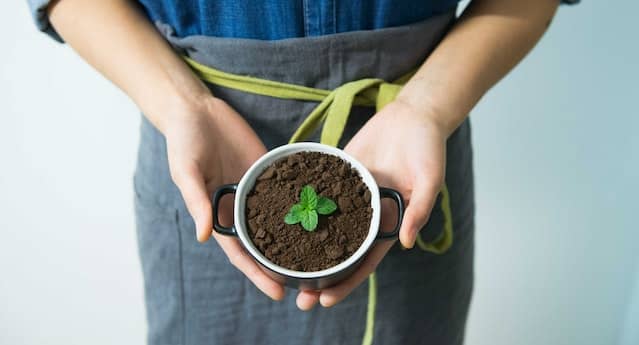
A compostable material, as the name suggests, refers to a material that can serve as natural compost or fertilizer, called “humus,” a natural fertilizer that facilitates plant growth.
Compostable items decompose way too quickly compared to non-compostable materials. They take up to 180 days or less to break down into pieces and yield compost.
A compostable material is often processed in special environments. For example, it can be a large hot compost pile or an industrial facility used to process compostable goods.
These materials do not harm the environment. Rather, they can be helpful too. After these materials are decomposed, the residue acts like natural fertilizers to augment the process of making the earth greener and saving the environment.
You would find most compost bins in green color. A compost bin should only have organic material to recycle organic waste.
Typical examples of compostable materials include plant and kitchen residues and natural wastes such as food and vegetable waste.
Biodegradable vs Compostable: Comparison by Features
Let’s have a quick look at the table of comparison between biodegradable and compostable material for our better understanding.
The table below compares biodegradable and compostable materials according to their features.
| Features | Biodegradable | Compostable |
| The key difference | Not all biodegradable materials are compostable. | All compostable materials are biodegradable. |
| Harmfulness | Some biodegradable materials may leave harmful residues and toxins after decomposition. | Compostable materials are not harmful to Earth. They do not leave any toxins or harmful substances on the Earth, or the environment. |
| Effect on Earth’s fertility | Plant growth may be affected at a place where biodegradable material is decomposed if it leaves harmful toxins. | Compostable material does not harm the earth’s fertility. It does not affect plant growth during or after the decomposition. |
| Key ingredients | Biodegradable materials are made up of natural and artificial substances. | Compostable materials are made up of purely organic substances. |
| Processes involved | Biodegradable materials degrade naturally. They typically use bacteria, fungi, yeasts, molds, and algae. | Compostable materials require special procedures like heat to be decomposed in a special environment. |
| Decomposition time | Biodegradable materials take longer time, up to a year, to decompose. | Compostable materials take less time to decompose, typically within 180 days or earlier. |
Biodegradable vs Compostable: The Advantages of Using Them in a Business
Every professional business is ethically responsible towards the environment. That’s why renowned brands and companies are always concerned about saving the environment.
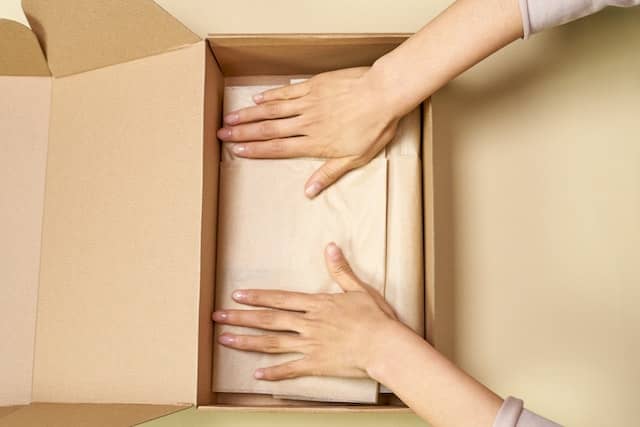
Their products and packaging bear special tags of “biodegradable” or “compostable.”
Why do they do so? Let’s discuss a few reasons below.
- These businesses support the genuine cause of promoting a green and clean environment.
- They need to comply with the state’s rules and regulations that ensure environmental sustainability.
- New businesses grab customer attention by using the catch words like “eco-friendly” and “sustainability”.
- Sharing the environment’s cause gives customers and society a message that a particular business is not harming the environment in the long run; rather it is working to save it.
- Caring for the environment elevates the brand’s image and popularity and earns a loyal clientèle.
- A business that cares about the environment can also increase its profit margins as it naturally gains respect and affiliation from its customers.
So, if you want to establish a business that people pay attention to, you need to ensure that your business is environmentally friendly too.
Even if you are not doing enough, you must show seriousness towards it. Your customers would start taking your business seriously. You will experience this in your sales.
How to Choose between Biodegradable and Compostable Materials for Your Business?
Now that you know the importance of using biodegradable and compostable materials in your business, let’s find out how to choose between them.
If you are in a manufacturing business, you should try your best to source biodegradable raw materials. This will make sure that your products will be made of biodegradable substances.
You can consider the following materials to ensure you are on the right track for choosing biodegradable materials.
- Bioplastic
- Biopolymer
- Thermoplastic
- Paper
- Manure
- Animal and plant waste
The above-mentioned materials are a few examples of biodegradable materials. There can be hundreds of them. You can ask for professional lab testing or certification from your vendor that the raw material is biodegradable.
If you want compostable materials, you can take help from some standards to check if the materials comply with the requirements to qualify as compostable.
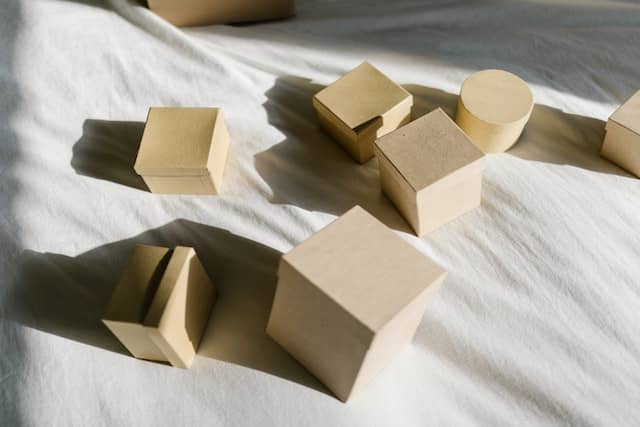
American Society of Testing and Materials (ASTM) provides testing and certifications for materials in this regard. There are different standards set by ASTM that categorize materials as being compostable.
For example, ASTM Standard D6400 certifies that a product is compostable within 180 days under a special environment in a commercial or industrial facility. ASTM Standard D6868 also certifies the product’s compostability.
You can also use other institutes to certify and validate the compostability. These institutes include Biodegradable Product Institute (BPI) and Compost Manufacturing Alliance (CMA).
You can also find testing facilities in Europe to identify and validate that a product’s features qualify as “compostable.”
You can check your products or raw material against these tests and certifications and use them on your website as a clear message to your customers.
So, you need to be sure of using compostable material for your business if you want to ensure sustainable products with your company’s products and packaging.
You can also display these certifications on your website to increase your brand’s responsibility and commitment to the environment’s sustainability.
Biodegradable vs Compostable: Packaging Options for Businesses
Packaging can act as a hidden weapon for your business to win the battle against your competitors. This is especially true if you are selling the same products as others.
You can make a difference by introducing eco-friendly packaging to your company.
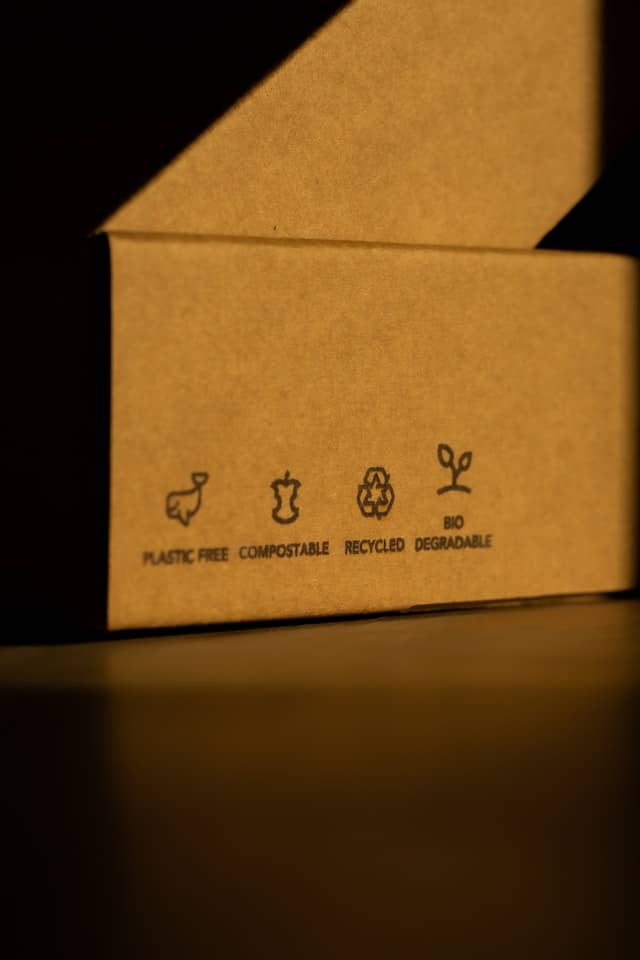
But, what type of packaging should you use? A biodegradable packaging or compostable packaging?
You can choose biodegradable materials to enhance your business opportunities.
Biodegradable packaging is easily available. You will have tremendous options to use biodegradable packaging. You can use multiple types of boxes made of paper and wood.
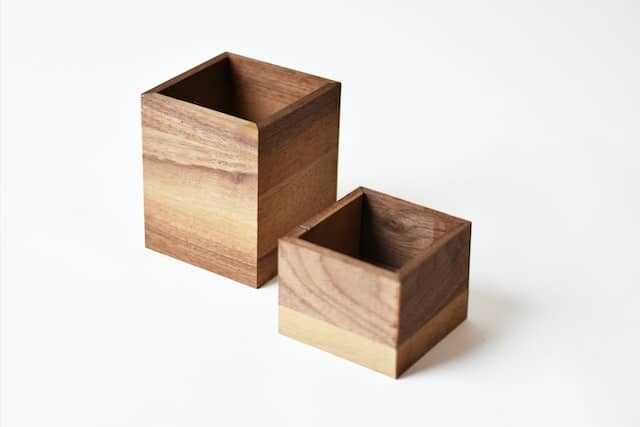
You will have to go the extra mile if you want to use compostable packaging for your business. You would have to search for special compostable packaging materials and suppliers who offer compostable packaging.
Using compostable packaging may have a highly positive effect on your business. But it would incur additional costs to your business as they are more expensive than simple biodegradable packaging.
You can choose compostable packaging if you have a customer base passionate about saving the environment. You can earn more profit margins while including the additional cost of compostable packaging in your product’s prices.
Biodegradable vs Compostable Packaging: Does It Help Increase Your Business?
Using sustainable or eco-friendly packaging can increase your business. You just need to market your packaging ideas well.
Most customers would not be aware of the difference between biodegradable and compostable. You have the opportunity to inform your customers about how your packaging is saving the environment.
This will add value to your business. You may be surprised with the results if you mention “biodegradable” or “compostable” on the packaging.
Mentioning “compostable” and “biodegradable” does not have to be an expensive initiative.
If you are a small business in the initial stage, you may explore packaging ideas. Little steps to your packaging can turn your business for good.
You can get stickers with “sustainable” and “biodegradable” mentioned on them. You can just paste those stickers into your general packaging. This will serve the purpose while saving you a lot of costs simultaneously.
FAQs about Biodegradable vs Compostable Materials
The following are answers to the most frequently asked questions about biodegradable vs compostable materials. Read them to have additional information.
Is Biodegradable Better than Compostable?
No, considering the environment, biodegradable is not better than compostable materials. Most things are biodegradable. Even the most notorious one: plastics. There are many plastics in the market that are specially developed to biodegrade.
A biodegradable material takes longer to decompose. On the other hand, compostable materials biodegrade quickly. The process is expedited if it is done in special environments like a commercial compostable facility.
What Is the Most Common Biodegradable and Compostable Packaging in E-commerce?
The most common e-commerce packaging is corrugated boxes. They are made of paper, making them less harmful to the environment.
If you do your packaging on your own, you have all the freedom to play around. Just try to market these words well on your packaging, and you will get positive results.
Many types of boxes are used in e-commerce. You can get biodegradable and compostable boxes in different price ranges.
Other common types of packaging in e-commerce include paper bags, mailers, flyers, and wooden boxes.
What Are Home Composters?
Home composters are special devices meant to be used in your homes to compost small amounts of organic waste. You would find most home composters in kitchens.
They are typically used to compost food waste to turn them into natural fertilizers. This humus-like fertilizer can be used in home gardens to augment plant growth.
What Are Non-biodegradable Products and How Can They Be Harmful?
Non-biodegradable products or materials are made of inorganic substances such as harmful toxins and chemicals. Typical ingredients of non-biodegradable material include plastic bags, cans, and bottles.
These materials do not decompose easily under natural circumstances. They may take up to thousands of years until they are fully decomposed. So, they pollute the natural environment and cause a disturbance to the ecosystem.
Additionally, when non-biodegradable products decompose, they leave hazardous residue on the earth and the environment. The harmful chemicals and toxins damage the soil’s ability to grow plants. These materials also pollute water in the long run.
Can Plastic Be Compostable?
Yes. Plastic can be biodegradable and compostable. Although plastic is generally known to decompose over thousands of years, eco-friendly plastics also exist.
Compostable plastic is made of special compostable materials like plant wastes, sugar beets, seaweed, etc.
The materials used in compostable plastic determine how long it will take to decompose. A typical compostable plastic may decompose within six months.
Final Verdict
From the discussion in this article, we may conclude that compostable materials are more eco-friendly than biodegradable materials. While a biodegradable material is also a safe option, you must decide what suits your business best.
Ideally, all businesses should at least prefer biodegradable materials over non-biodegradable ones. Every responsible business gives a certain portion of its income to the environment.
If you sell on great profit margins, you may also consider using compostable materials. We can help you source quality biodegradable or compostable materials at affordable costs. Ask for a free quote today and say hello to the green environment.
